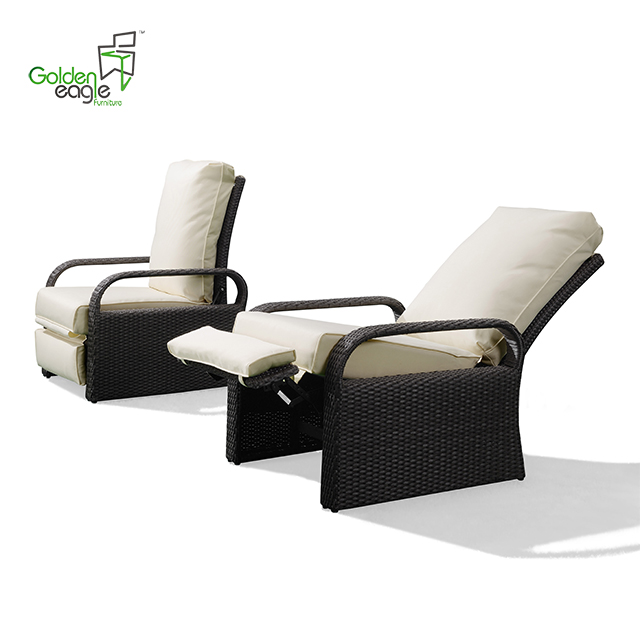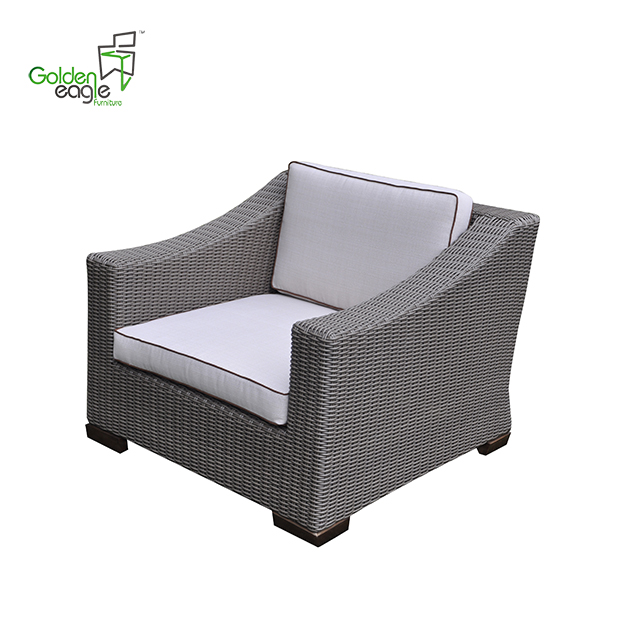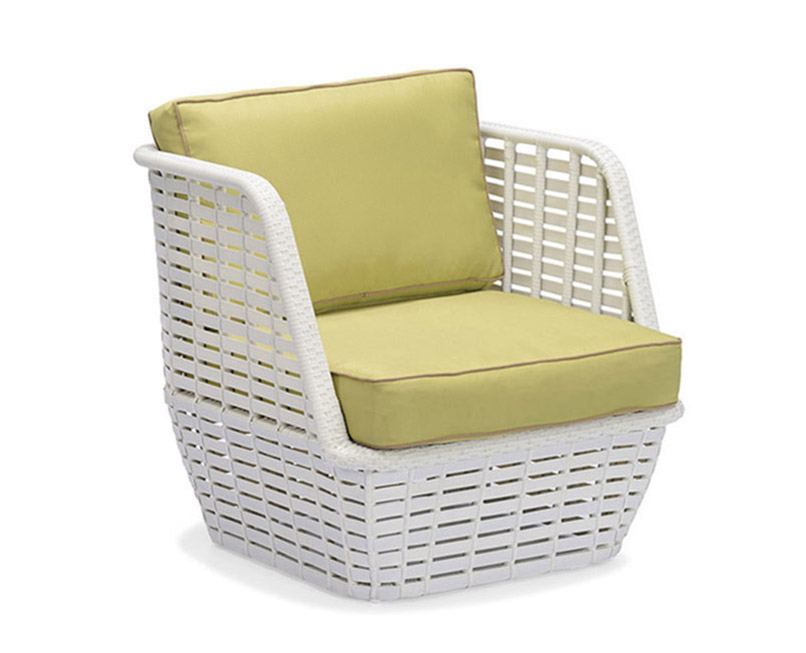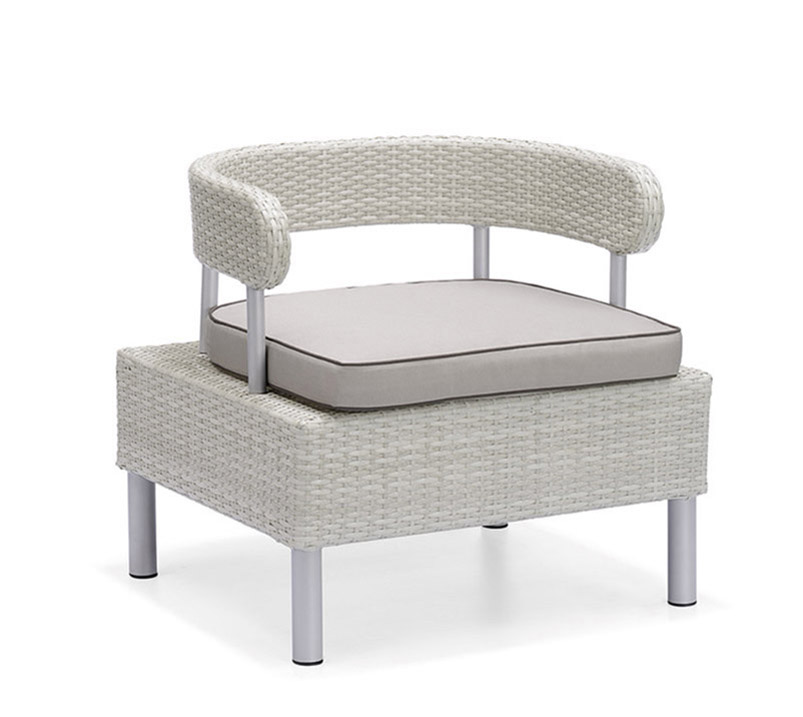Lounge chairs Furniture
Lounge chairs furniture that means single chair, with rattan weaving design or aluminium frame design, lounge chair and make 1+1+1 set or L sectional sofa seating set. You can decorate your garden or home in many different ways.
Handwoven premium resin wicker UV resistant
Rust-resistant powder-coated frames
Cushions included with 30 density sofa foam
Versatile tempered glass tables
Cushions also available with 100% waterproof fabric.
outdoor lounge chairs furniture with different style and hand weaving
If you have any questions, please contact with us directly. Outdoor Sofa Furniture are produced
by Golden Eagle Outdoor Furniture With High Quality and Good Appearance. Welcome you can visit our Factory.For any inquiry,Please send mail directly to us.
Lin Yiting: Whether a company is suitable for importing waste paper should consider the geographical location of the company, whether it is near or far from the main ports, what kind of imported waste paper is produced, whether there are local fiber resources, prices, etc.
Fujian Nanzhi is located on the southeast coast of China. The port is only 180 kilometers away from the factory and the inland transportation distance is short. Under normal circumstances, the cost of producing deinked pulp for newsprint is about 200 yuan less than that of the self-produced TMP. However, in November 2002, employees of the United States West Coast port went on strike. After 11 days of port crushing, the CIF value of old newspapers soared from an average of less than US$110/ton to US$153/ton, resulting in deinked pulp costs and TMP. Flat, if the strike is extended for a few days, or if there is any sign of trouble, the supply of waste paper may be interrupted, so the dependence on imported waste paper is high, and the use of waste paper and TMP are less compared to the strength and stiffness of newsprint, giving the printing process and reading Difficult to cause certain difficulties, we must adjust the production process, increase the amount of chemicals, such as starch, the cost has increased accordingly. Therefore, we must consider the conditions, regardless of cost, we all come to waste paper projects.
Guo Xinghao: In the import of waste paper, it is necessary to analyze and demonstrate according to the specific circumstances of each company. It is necessary to correctly grasp and make decisions, and it is impossible to look at what projects people follow and what projects they follow. It can be said that companies with a small number of varieties and large import volumes have a relatively competitive advantage.
In my opinion, the following issues must be paid particular attention to the import of waste paper:
Prudent cooperation. The enterprise must conduct a thorough examination of the operating waste paper supplier, understand the true status of the business unit, supply and sales sources and history, economic strength, and creditworthiness, and select reliable credit supply partners and agreements for supply in order to avoid being deceived.
Strictly check. The impurity content of waste paper should be strictly checked so as not to buy a pile of “foreign wasteâ€. At the same time, it must prevent the return of harmful bacteria and insects, so as to avoid serious impact. When checking quality problems, it is necessary to pay attention to saving strong claims, in particular, to photograph the number of the container being carried. In 2002 alone, due to waste paper quality problems, Huatai timely issued a certificate of claim that is relevant and internationally effective, recovering direct economic losses of more than 75,000 US dollars.
Reasonable use. When purchasing waste paper, enterprises should combine and rationalize the use of their own equipment, technical strength, and production varieties. At the same time, they must fully and rationally use waste paper of various grades into cardboard to reduce unnecessary costs.
Prevent monopoly. Excessive demand for and dependence on waste paper will often prompt the formation of monopoly by international waste paper companies, which will cause great pressure on us. Therefore, on the one hand, we must establish a coalition of waste paper importing organizations on the one hand, and on the other hand we can strive to achieve friendly cooperation and even joint ventures with foreign waste paper recycling companies (Associations).
Actively innovate. Paper-making companies must join hands with machinery manufacturers, chemical manufacturers and research institutes to jointly develop advanced deinking equipment, deinking agents, and enhancer chemicals, research and develop new technologies, and constantly improve the use of waste paper. The equipment and equipment of recycled papermaking and the adaptability of paper varieties will promote the rapid development of domestic waste paper utilization.
Xue Wenming: Domestic enterprises must establish a good “disaster waste crisis†early warning mechanism. They can't just focus on burying production, but only market research and development. At the same time, we must introduce new equipment and new technologies, and vigorously develop the fast-growing and high-yield forest bases, implement the “forestry-paper integration†project, and establish our own papermaking enterprises' own raw material bases. The powerful large-scale paper-making companies may consider taking the lead in “going out†to invest in pulp mills abroad.
â— What are the opinions and suggestions on waste pulp?
Sun Yuming: The state should formulate relevant reforms or regulations, increase the recovery and utilization of waste paper products in the country, and guide the citizens in rational use of wastes. At the same time, it should vigorously promote the benefits of waste recycling.
Xue Wenming: Just now the powerful companies can “go outâ€. I think at this stage we can consider Russia’s investment in establishing a wood pulp production base. Because Russia has a rich natural wood forest and borders on China, transportation is also more convenient. Moreover, the reform of its economic system is in progress. Many large-scale pulp and paper companies are running out of capacity and are in urgent need of capital injection. Large-scale papermaking companies with strong domestic capabilities, such as shareholding, mergers, alliances, leasing, etc., will be able to transform them and expand their production capabilities, which will promote mutual development and achieve "win-win."
In the process of cooperation, domestic papermaking companies can formulate a reasonable profit margin for the other party (according to international wood pulp prices, exchange rates, transportation costs, etc.) and give the pulp mill a stable purchase price that is not affected by the international market. This will not only ensure the profits of the foreign pulp mills, but also enable the companies themselves to take the initiative in production and operation, cost control and market development, and greatly promote the sustainable and stable development of the company. In a comprehensive comparison, this road is feasible and suitable for domestic large-scale papermaking companies.
Lin Yiting: At present, China's waste paper recycling is still not standardized, waste paper is not properly classified, paperboard is mixed, newspapers, magazines, and office mixed waste paper are mixed. This forces paper mills to invest a lot of labor to select and is not suitable for use by the factory. The waste paper was then shipped out and sold to other available paper mills. The labor and transportation costs were increased, and the quality was mixed. The paper mills could only be used "downgraded" to waste resources.
It is suggested that the relevant departments should, like the United States and European countries, formulate a set of waste paper classification standards so that they can be used rationally and make the best use of them.
Guo Xingyu: Objectively speaking, imported waste paper has its irreplaceable advantages, but we must not neglect the recycling of domestic waste paper. In 2001, China's domestic recycling of waste paper was 9.95 million tons, and the recycling rate was only 27%, which was well below the world average of 44%. This shows that the domestic market still has great potential to tap.
Some overseas management experience in waste paper recycling is also worth learning from. In some countries and regions, the government provides a certain amount of subsidies to the material recovery department every year, and collectively reclaims and disposes of used materials by specialized agencies. In order to encourage the recycling of waste paper and production of recycled cultural paper, foreign countries implement policies such as tax relief and sales price subsidies for manufacturers of recycled culture paper: some countries also require enterprises and public institutions to use a certain percentage of recycled cultural paper. Catering industry is like McDonald's. Etc., must use a certain percentage of ordinary recycled cultural paper, such as receipt printing paper.
To solve the waste paper resource problem, our company can not wait and rely on it. It can combine several companies to establish a domestic waste paper recycling network. This can not only save the country a lot of money, but also provide new business opportunities for related industries in the country. To a certain extent, the increase in the price of imported waste paper is suppressed.
The palliative needs to be a permanent cure, and only treating both the symptoms and the disease is the key to treatment. Our domestic companies must combine their own advantages, make full use of national policies to vigorously plant and afforestation, solve resource problems as early as possible, and realize forestry, pulp, and paper-bodyization, so that we can resolve the “restrained by people†on products as early as possible. At present, including Huatai, there are four companies such as Shandong Quanlin and Sun, five enterprises such as Fujian Nanyang and Qingshan, and Yueyang in Hunan, Yunnan Yunjing, and so on. Even APP and Stora Enso compete with each other. In the Guangxi afforestation and pulp plant, I think around 2010, we can basically solve the crisis of imported waste paper and wood pulp. 



Lounge Chairs Furniture,Modern Outdoor Furniture,Timber Outdoor Furniture,Wicker Outdoor Furniture
Golden Eagle Outdoor Furniture Co., LTD. , https://www.geleisurefurnitures.com